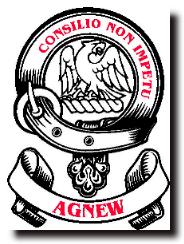 There are at least two possible derivations of this name. Firstly, from the Norman French barony of d'Agneux, via England and Liddesdale in the Scottish Borders. Secondly, from a branch of O'Gnimh, who were the hereditary poets of the O'Neils in Antrim, Ireland. The name was written in English as O'Gnive, then O'Gnyw and later O'Gnew.
There are at least two possible derivations of this name. Firstly, from the Norman French barony of d'Agneux, via England and Liddesdale in the Scottish Borders. Secondly, from a branch of O'Gnimh, who were the hereditary poets of the O'Neils in Antrim, Ireland. The name was written in English as O'Gnive, then O'Gnyw and later O'Gnew.
Whatever its origins, the family became established in Wigtownshire in south-west Scotland. Andrew Agnew was appointed hereditary Sheriff of Wigtown in 1451 and his descendants hold that office to this day. Lochnaw Castle was their base with another branch in Lochryan. Andrew Agnew of Lochnaw was killed at the Battle of Pinkie in 1547.
The family prospered and there were a number of judicious marriages with other wealthy families in the area. The 5th Baronet, Sir Andrew, commanded a regiment at the Battle of Dettingen, Bavaria in 1743, when King George II commanded the English and Hanoverian troops against the French (the last monarch to do so directly). When the king commented on the way the French cavalry had penetrated Sir Andrew's troops he replied "Yes, please your Majesty, but they didna win back again". Sir Andrew later held Blair Castle in Perthshire against the Jacobite forces.
The 6th Baronet married the daughter of the Irish Lord Kingsdale and the 7th Baronet inherited the title and estates. He set about rebuilding Lochnaw castle (though it is now no longer in Agnew hands). A number of Irish Agnews emigrated to the American colonies, especially in Pennsylvania. The 11th Baronet, Sir Crispin Agnew of Lochnaw, is one of Scotland's leading heraldic experts and is the Rothesay Herald at the Court of the Lord Lyon.
The Agnew clan motto is "Consilio non impetu" which means "By wisdom, not force".
There is an Agnew clan Web site at Scottish Heritage.



